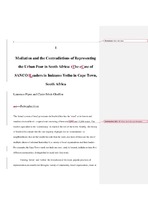| dc.contributor.author | Piper, Laurence | |
| dc.contributor.author | Bénit-Gbaffou, Claire | |
| dc.date.accessioned | 2021-02-02T12:05:44Z | |
| dc.date.available | 2021-02-02T12:05:44Z | |
| dc.date.issued | 2014 | |
| dc.identifier.citation | Piper, L., & Bénit-Gbaffou, C. (2014). Mediation and the contradictions of representing the urban poor in South Africa: The case of SANCO leaders in Imizamo Yethu in Cape Town, South Africa. In: von Lieres B., Piper L. (eds) Mediated Citizenship. Frontiers of Globalization. Palgrave Macmillan, London. | en_US |
| dc.identifier.isbn | 978-1-137-40531-9 | |
| dc.identifier.uri | https://doi.org/10.1057/9781137405319_2 | |
| dc.identifier.uri | http://hdl.handle.net/10566/5816 | |
| dc.description.abstract | The formal system of local governance in South Africa has the ‘ward’ as its lowest and smallest electoral level — a spatial unit consisting of between 5,000 and 15,000 voters. The ward is equivalent to the ‘constituency’ in much of the rest of the world. Notably, the history of South Africa means that the vast majority of people live in ‘communities’ or neighbourhoods that are far smaller in scale than the ward, and most of these are the site of multiple claims of informal leadership by a variety of local organisations and their leaders. For example, the Cape Town ward, in which our case study is located, includes at least five different communities, distinguished in racial and class terms. | en_US |
| dc.language.iso | en | en_US |
| dc.publisher | Palgrave Macmillan, London | en_US |
| dc.subject | Local leaders | en_US |
| dc.subject | Green belt | en_US |
| dc.subject | South African National Civic Organ | en_US |
| dc.subject | Dominant party | en_US |
| dc.subject | Double dealing | en_US |
| dc.title | Mediation and the contradictions of representing the urban poor in South Africa: The case of SANCO leaders in Imizamo Yethu in Cape Town, South Africa. | en_US |
| dc.type | Book | en_US |

